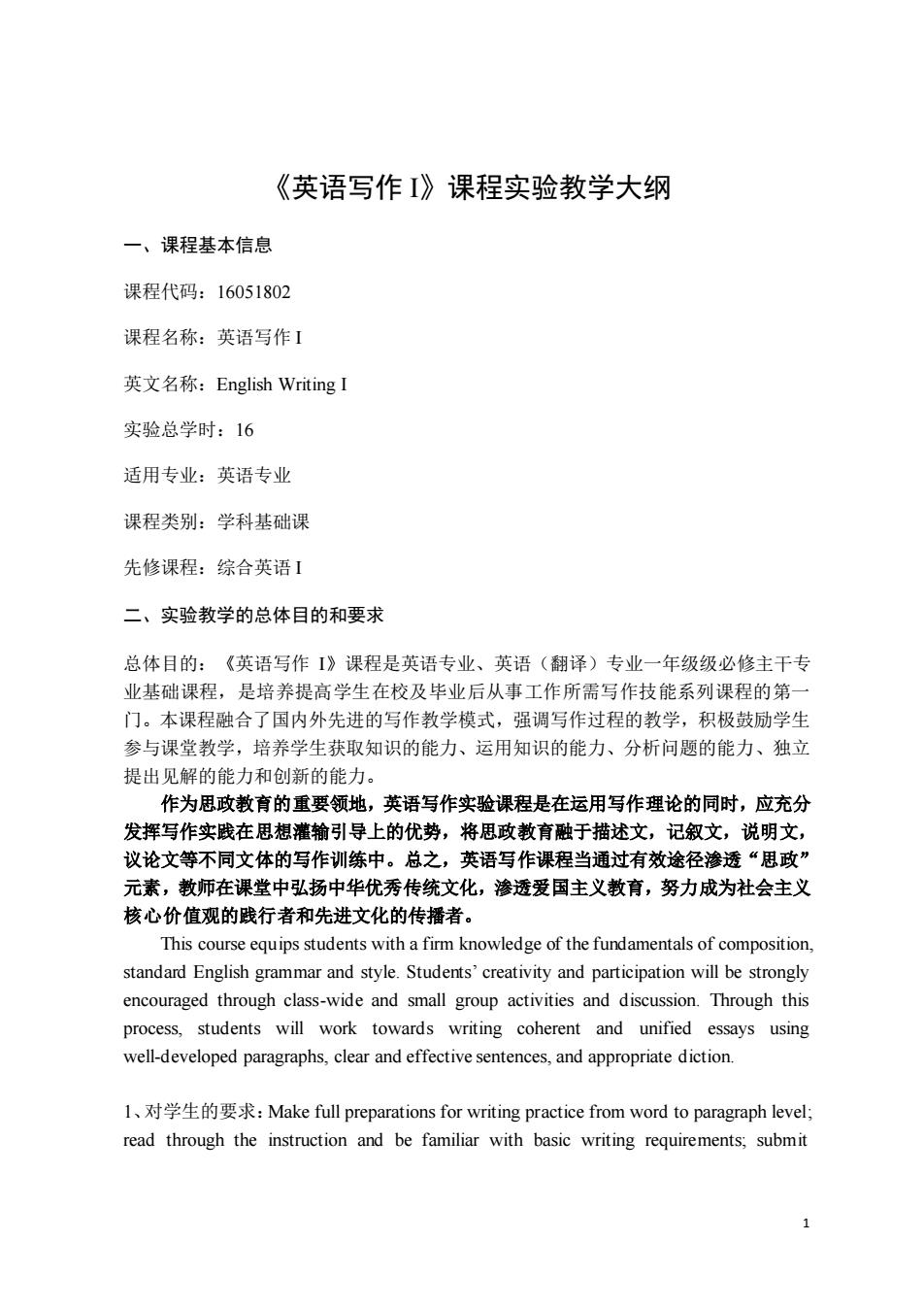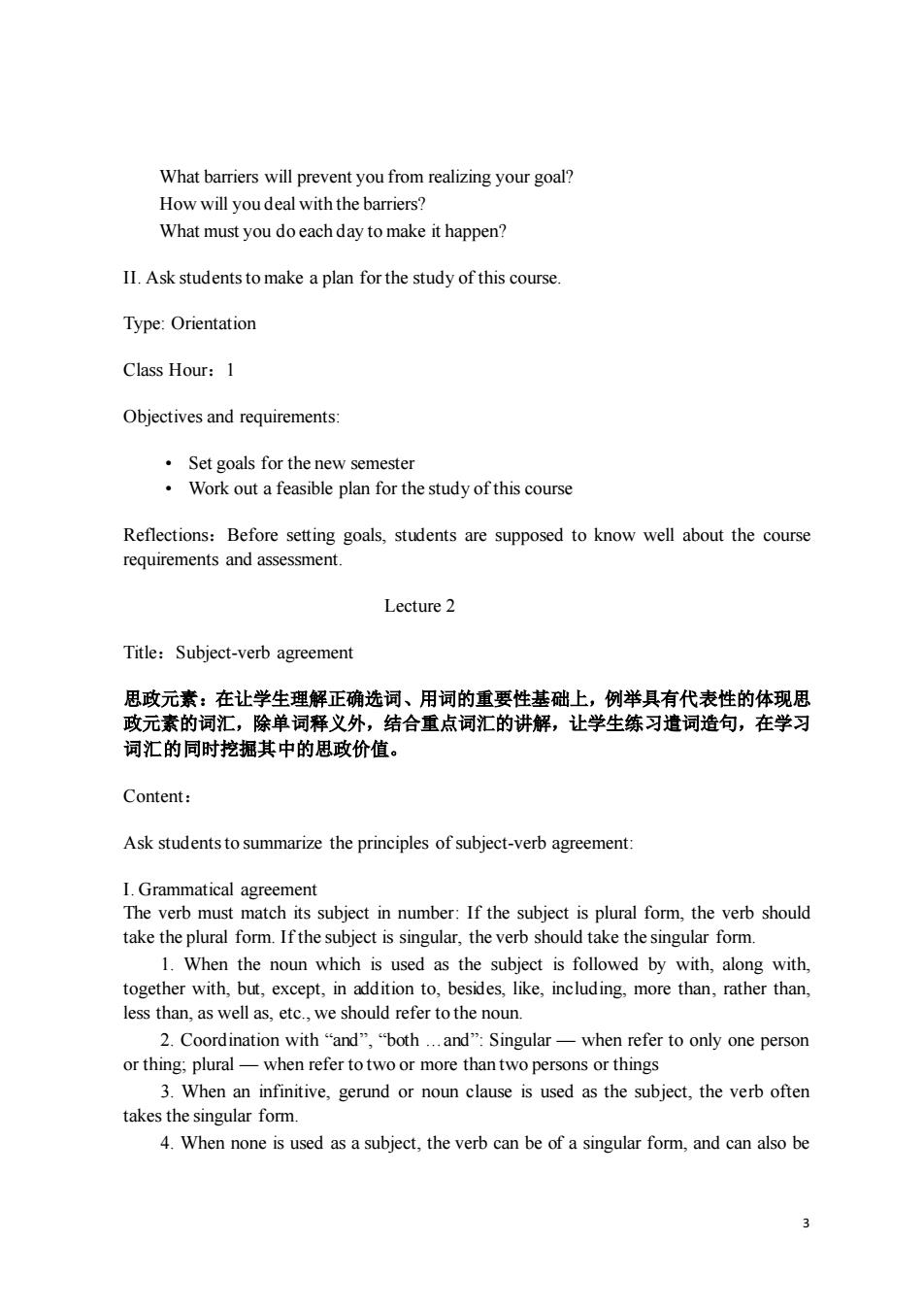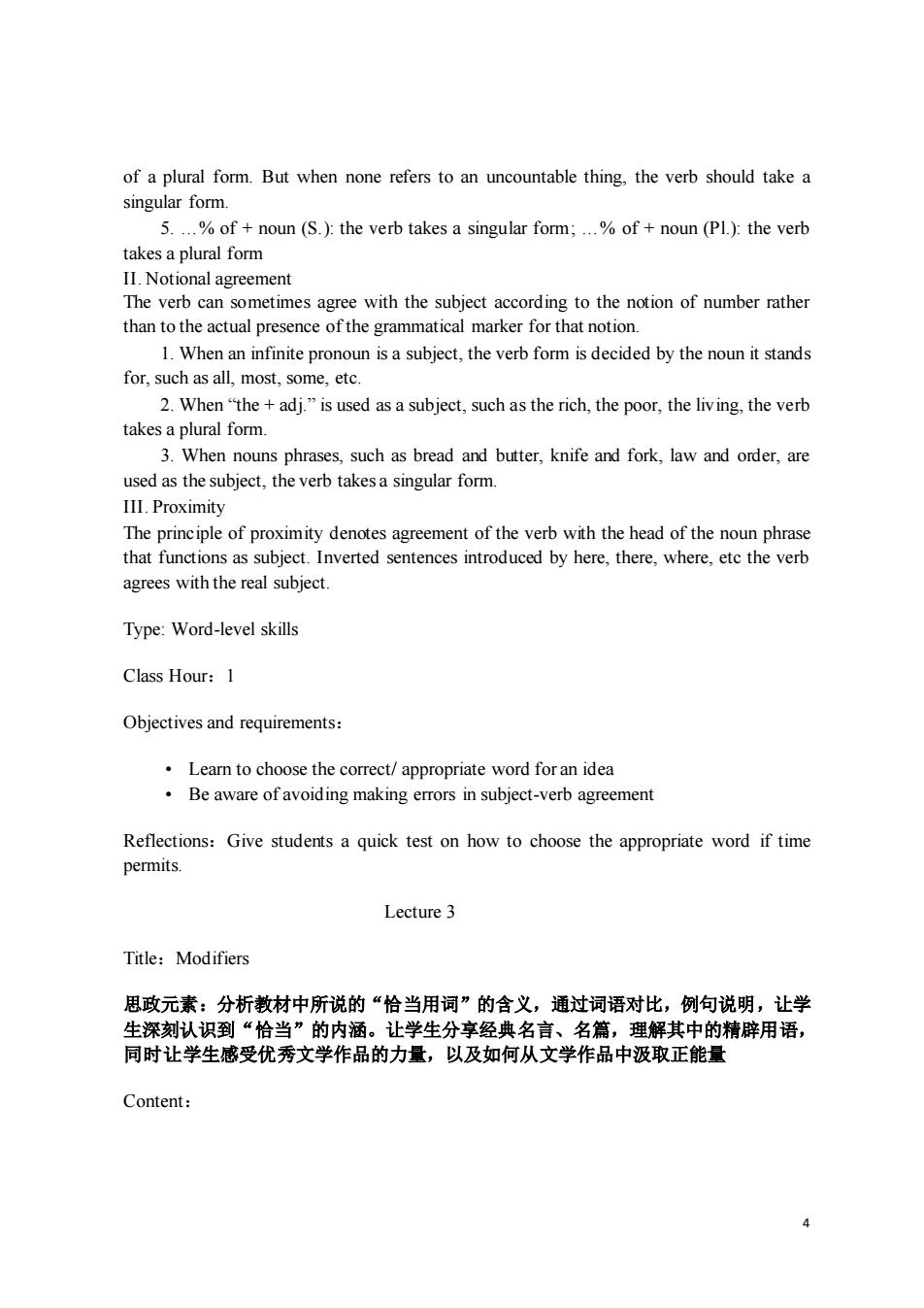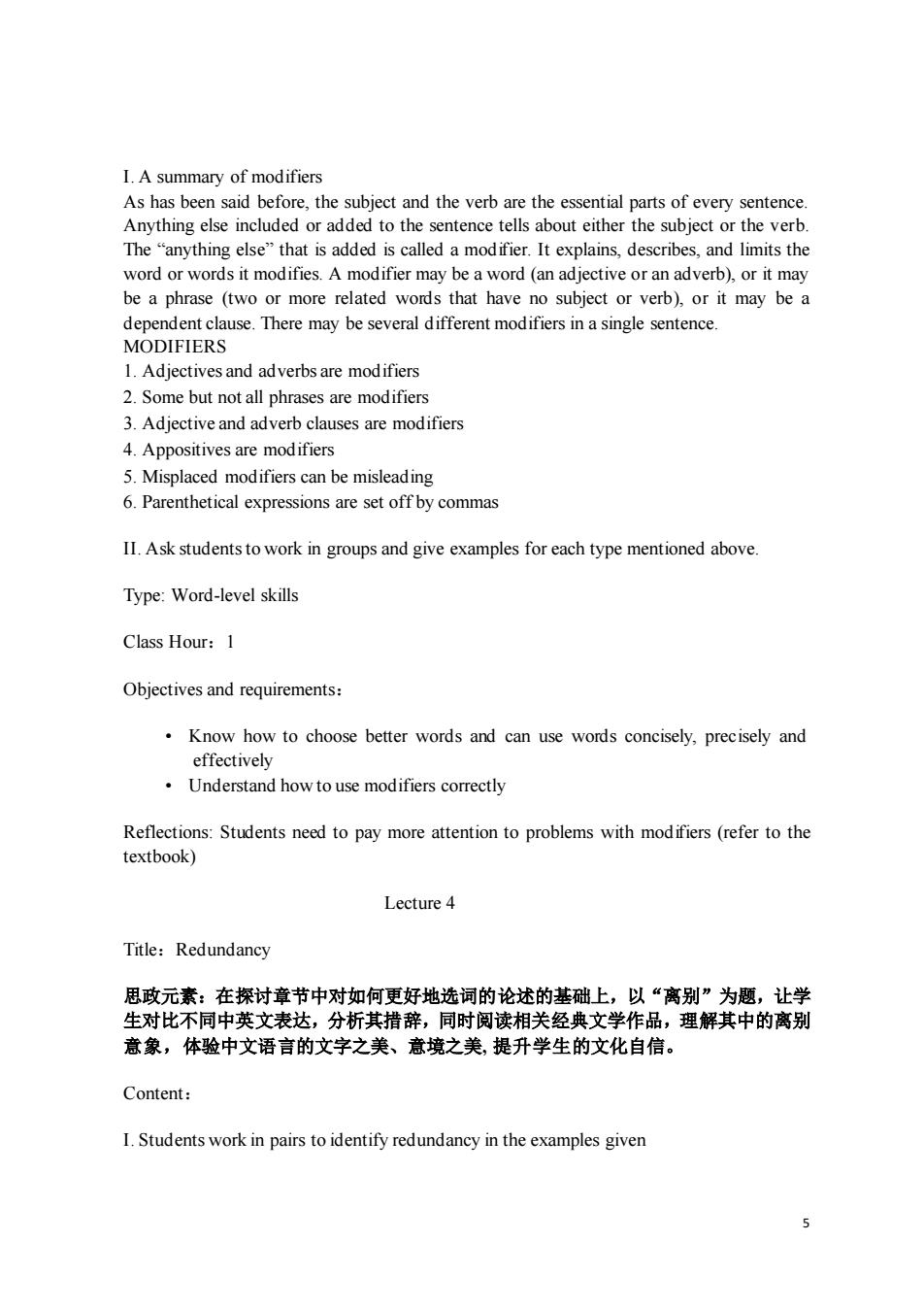
《英语写作I》课程实验教学大纲 一、课程基本信息 课程代码:16051802 课程名称:英语写作1 英文名称:English Writing I 实验总学时:16 适用专业:英语专业 课程类别:学科基础课 先修课程:综合英语1 二、实验教学的总体目的和要求 总体目的:《英语写作》课程是英语专业、英语(翻译)专业一年级级必修主干专 业基础课程,是培养提高学生在校及毕业后从事工作所需写作技能系列课程的第一 门。本课程融合了国内外先进的写作教学模式,强调写作过程的教学,积极鼓励学生 参与课堂教学,培养学生获取知识的能力、运用知识的能力、分析问题的能力、独立 提出见解的能力和创新的能力。 作为思政教育的重要领地,英语写作实验课程是在运用写作理论的同时,应充分 发挥写作实贱在思想灌输引导上的优势,将思政教育融于描述文,记叙文,说明文, 议论文等不同文体的写作训练中。总之,英语写作课程当通过有效途径渗透“思政” 元素,教师在课堂中弘扬中华优秀传统文化,渗透爱国主义教育,努力成为社会主义 核心价值观的贱行者和先进文化的传播者 This course equips students with a firm knowledge of the fundamentals of composition. standard English grammar and style.Students'creativity and participation will be strongly encouraged through class-wide and small group activities and discussion.Through this process,students will work towards writing coherent and unified essays using well-developed paragraphs,clear and effective sentences,and appropriate diction. I、对学生的要求:Make full preparations for writing practice from word to paragraph level; read through the instruction and be familiar with basic writing requirements,submit 1
1 《英语写作 I》课程实验教学大纲 一、课程基本信息 课程代码:16051802 课程名称:英语写作 I 英文名称:English Writing I 实验总学时:16 适用专业:英语专业 课程类别:学科基础课 先修课程:综合英语 I 二、实验教学的总体目的和要求 总体目的:《英语写作 I》课程是英语专业、英语(翻译)专业一年级级必修主干专 业基础课程,是培养提高学生在校及毕业后从事工作所需写作技能系列课程的第一 门。本课程融合了国内外先进的写作教学模式,强调写作过程的教学,积极鼓励学生 参与课堂教学,培养学生获取知识的能力、运用知识的能力、分析问题的能力、独立 提出见解的能力和创新的能力。 作为思政教育的重要领地,英语写作实验课程是在运用写作理论的同时,应充分 发挥写作实践在思想灌输引导上的优势,将思政教育融于描述文,记叙文,说明文, 议论文等不同文体的写作训练中。总之,英语写作课程当通过有效途径渗透“思政” 元素,教师在课堂中弘扬中华优秀传统文化,渗透爱国主义教育,努力成为社会主义 核心价值观的践行者和先进文化的传播者。 This course equips students with a firm knowledge of the fundamentals of composition, standard English grammar and style. Students’ creativity and participation will be strongly encouraged through class-wide and small group activities and discussion. Through this process, students will work towards writing coherent and unified essays using well-developed paragraphs, clear and effective sentences, and appropriate diction. 1、对学生的要求:Make full preparations for writing practice from word to paragraph level; read through the instruction and be familiar with basic writing requirements; submit

assignments before the deadline.work out a draft and o revision afterwards 2、对教师的要求:Design the teaching process,.adjust teaching contents when necessary: give students guidance as to how to form good writing habits,how to analyze sentences and paragraphs etc.;help students to improve writing skills necessary to success in college and in most careers 3、对实验条件的要求:No special requirements 三、实验教学内容 写作实贱的各个环节需巧妙融入思政内容,凸显思政教育;要强化方向引导,以 日常作文的练习为着力点,与大学思政教育体系积极呼应,相得益彰。要结合大学生 的认知特点,阶段性开设不同的主题练习,有目的地开展写作指导。在句子和段落写 作练习中,记叙类的可增加描写中国文明及文化历史,中国在经济发展等方面取得的 重大成就等主题,激发学生的民族自豪感和爱国主义情怀。说明类的,可选取有关表 述我国改革开放政策,习总书记讲话等的内容的文章,让学生深入理解并写出自己的 体会,树立主人翁意识。在议论类的写作训练中,针对不同的写作话题,和学生一起 讨论,引导学生在写作中表达正确的人生观,价值观和世界观。 Lecture 1 Title:Setting specific goals 思政元素:让学生了解英语写作课程特点,确定目标。同时让学生认识到,应把作文 学习当中的认知和思考行为,当做思政教育的内化过程。写一篇好的作文需要经历 个由观察分析到语言组织、文字表述的转化过程,这一过程与思政教育所追求的效果 异曲同工。 Content: 1.Students work in pairs todiscuss over the questions following: 1.What is your goal for this semester concerning this course?State your goal briefly. 2.Be specific about when you will reach your goal: Why is this goal meaningful for you? What steps are required in order to realize your goal? What will your checkpoints be?(end of day,end of week tracking..)
2 assignments before the deadline; work out a draft and o revision afterwards. 2、对教师的要求:Design the teaching process; adjust teaching contents when necessary; give students guidance as to how to form good writing habits, how to analyze sentences and paragraphs etc.; help students to improve writing skills necessary to success in college and in most careers 3、对实验条件的要求:No special requirements 三、实验教学内容 写作实践的各个环节需巧妙融入思政内容,凸显思政教育;要强化方向引导,以 日常作文的练习为着力点,与大学思政教育体系积极呼应,相得益彰。要结合大学生 的认知特点,阶段性开设不同的主题练习,有目的地开展写作指导。在句子和段落写 作练习中,记叙类的可增加描写中国文明及文化历史,中国在经济发展等方面取得的 重大成就等主题,激发学生的民族自豪感和爱国主义情怀。说明类的,可选取有关表 述我国改革开放政策,习总书记讲话等的内容的文章,让学生深入理解并写出自己的 体会,树立主人翁意识。在议论类的写作训练中,针对不同的写作话题,和学生一起 讨论,引导学生在写作中表达正确的人生观,价值观和世界观。 Lecture 1 Title:Setting specific goals 思政元素:让学生了解英语写作课程特点,确定目标。同时让学生认识到,应把作文 学习当中的认知和思考行为,当做思政教育的内化过程。写一篇好的作文需要经历一 个由观察分析到语言组织、文字表述的转化过程,这一过程与思政教育所追求的效果 异曲同工。 Content: I. Students work in pairs to discuss over the questions following: 1. What is your goal for this semester concerning this course? State your goal briefly. 2. Be specific about when you will reach your goal: Why is this goal meaningful for you? What steps are required in order to realize your goal? What will your checkpoints be? (end of day, end of week tracking…)

What barriers will prevent you from realizing your goal? How will you deal with the barriers? What must you do each day to make it happen? II.Ask students to make a plan for the study of this course. Type:Orientation Class Hour:1 Objectives and requirements .Set goals for the new semester Work out a feasible plan for the study of this course Reflections:Before setting goals,students are supposed to know well about the course requirements and assessment. Lecture2 Title:Subject-verb agreement 思政元素:在让学生理解正确选词、用词的重要性基础上,例举具有代表性的体现思 政元素的词汇,除单词释义外,结合重点词汇的讲解,让学生练习遣词造句,在学习 词汇的同时挖掘其中的思政价值。 Content: Ask students to summarize the principles of subject-verb agreement: I.Grammatical agreement The verb must match its subject in number:If the subject is plural form,the verb should take the plural form.If the subject is singular,the verb should take the singular form 1.When the noun which is used as the subject is followed by with,along with, together with,but,except,in addition to,besides,like,including.more than,rather than, less than.as well as.etc..we should refer to the noun. 2.Coordination with"and","both...and":Singular-when refer to only one person or thing:plural-when refer to two or more than two persons or things 3.When an infinitive,gerund or noun clause is used as the subject,the verb often takes the singular for 4.When none is used as a subject,the verb can be of a singular form,and can also be 3
3 What barriers will prevent you from realizing your goal? How will you deal with the barriers? What must you do each day to make it happen? II. Ask students to make a plan for the study of this course. Type: Orientation Class Hour:1 Objectives and requirements: • Set goals for the new semester • Work out a feasible plan for the study of this course Reflections:Before setting goals, students are supposed to know well about the course requirements and assessment. Lecture 2 Title:Subject-verb agreement 思政元素:在让学生理解正确选词、用词的重要性基础上,例举具有代表性的体现思 政元素的词汇,除单词释义外,结合重点词汇的讲解,让学生练习遣词造句,在学习 词汇的同时挖掘其中的思政价值。 Content: Ask students to summarize the principles of subject-verb agreement: I. Grammatical agreement The verb must match its subject in number: If the subject is plural form, the verb should take the plural form. If the subject is singular, the verb should take the singular form. 1. When the noun which is used as the subject is followed by with, along with, together with, but, except, in addition to, besides, like, including, more than, rather than, less than, as well as, etc., we should refer to the noun. 2. Coordination with “and”, “both …and”: Singular — when refer to only one person or thing; plural — when refer to two or more than two persons or things 3. When an infinitive, gerund or noun clause is used as the subject, the verb often takes the singular form. 4. When none is used as a subject, the verb can be of a singular form, and can also be

of a plural form.But when none refers to an uncountable thing,the verb should take a singular form. 5.%of+noun (S.):the verb takes a singular form:%of+noun (PL.):the verb takes a plural form II.Notional agreement The verb can sometimes agree with the subject according to the notion of number rather than to the actual presence of the grammatical marker for that notion 1.When an infinite pronoun is a subject,the verb form is decided by the noun it stands for,such as all,most,some,etc. 2.When"the+adj."is used as a subject,such as the rich,the poor,the living.the verb takes a plural form. 3.When nouns phrases,such as bread and butter,knife and fork,law and order,are used as the subject,the verb takesa singular form. III.Proximity The principle of proximity denotes agreement of the verb with the head of the noun phrase that functions as subject.Inverted sentences introduced by here,there,where,etc the verb agrees with the real subject Type:Word-level skills Class Hour:1 Objectives and requirements: .Leam to choose the correct/appropriate word foran idea Be aware of avoiding making errors in subject-verb agreement Reflections:Give students a quick test on how to choose the appropriate word if time permits. Lecture 3 Title:Modifiers 思政元素:分析材中所说的“恰当用词”的含义,通过词语对比,例句说明,让学 生深刻认识到“恰当”的内涵。让学生分享经典名言、名篇,理解其中的精辟用语, 同时让学生感受优秀文学作品的力量,以及如何从文学作品中汲取正能量 Content:
4 of a plural form. But when none refers to an uncountable thing, the verb should take a singular form. 5. …% of + noun (S.): the verb takes a singular form; …% of + noun (Pl.): the verb takes a plural form II. Notional agreement The verb can sometimes agree with the subject according to the notion of number rather than to the actual presence of the grammatical marker for that notion. 1. When an infinite pronoun is a subject, the verb form is decided by the noun it stands for, such as all, most, some, etc. 2. When “the + adj.” is used as a subject, such as the rich, the poor, the living, the verb takes a plural form. 3. When nouns phrases, such as bread and butter, knife and fork, law and order, are used as the subject, the verb takes a singular form. III. Proximity The principle of proximity denotes agreement of the verb with the head of the noun phrase that functions as subject. Inverted sentences introduced by here, there, where, etc the verb agrees with the real subject. Type: Word-level skills Class Hour:1 Objectives and requirements: • Learn to choose the correct/ appropriate word for an idea • Be aware of avoiding making errors in subject-verb agreement Reflections:Give students a quick test on how to choose the appropriate word if time permits. Lecture 3 Title:Modifiers 思政元素:分析教材中所说的“恰当用词”的含义,通过词语对比,例句说明,让学 生深刻认识到“恰当”的内涵。让学生分享经典名言、名篇,理解其中的精辟用语, 同时让学生感受优秀文学作品的力量,以及如何从文学作品中汲取正能量 Content:

1.A summary of modifiers As has been said before,the subject and the verb are the essential parts of every sentence Anything else included or added to the sentence tells about either the subiect or the verb The"anything else"that is added is called a modifier.It explains,describe ,and limits the word or words it modifies.A modifier may be a word (an adjective or an adverb).or it may be a phrase (two or more related words that have no subject or verb),or it may be a dependent clause.There may be several different modifiers in a single sentence. MODIFIERS 1.Adjectives and adverbs are modifiers 2.Some but not all phrases are modifiers 3.Adjective and adverb clauses are modifiers 4.Appositives are modifiers 5.Misplaced modifiers can be misleading 6.Parenthetical expressions are set offby commas II.Ask students to work in groups and give examples for each type mentioned above Type:Word-level skills Class Hour:1 Objectives and requirements: Know how to choose better words and can use words concisely.precisely and effectively Understand how to use modifiers correctly Reflections:Students need to pay more attention to problems with modifiers(refer to the textbook) Lecture4 Title:Redundancy 思政元素:在探讨章节中对如何更好地选词的论述的基础上,以“离别”为题,让学 生对比不同中英文表达,分析其措辞,同时阅读相关经典文学作品,理解其中的离别 意象,体验中文语言的文字之美、意境之美,提升学生的文化自信。 Content: I.Students work in pairs to identify redundancy in the examples given
5 I. A summary of modifiers As has been said before, the subject and the verb are the essential parts of every sentence. Anything else included or added to the sentence tells about either the subject or the verb. The “anything else” that is added is called a modifier. It explains, describes, and limits the word or words it modifies. A modifier may be a word (an adjective or an adverb), or it may be a phrase (two or more related words that have no subject or verb), or it may be a dependent clause. There may be several different modifiers in a single sentence. MODIFIERS 1. Adjectives and adverbs are modifiers 2. Some but not all phrases are modifiers 3. Adjective and adverb clauses are modifiers 4. Appositives are modifiers 5. Misplaced modifiers can be misleading 6. Parenthetical expressions are set off by commas II. Ask students to work in groups and give examples for each type mentioned above. Type: Word-level skills Class Hour:1 Objectives and requirements: • Know how to choose better words and can use words concisely, precisely and effectively • Understand how to use modifiers correctly Reflections: Students need to pay more attention to problems with modifiers (refer to the textbook) Lecture 4 Title:Redundancy 思政元素:在探讨章节中对如何更好地选词的论述的基础上,以“离别”为题,让学 生对比不同中英文表达,分析其措辞,同时阅读相关经典文学作品,理解其中的离别 意象,体验中文语言的文字之美、意境之美, 提升学生的文化自信。 Content: I. Students work in pairs to identify redundancy in the examples given